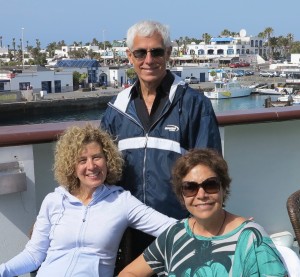 Our Mallorcan friend Caty is the inspiring leader of the International Integrators project 4 COS4S. When Caty became involved with International Integrators, she read El Estudio de China (The China Study), which immediately affected her awareness of her own eating patterns and those of her two school-aged nephews and their schoolmates. “It’s nothing like the Mediterranean diet that I grew up with,” she says. The more Caty learns about whole food, plant-based eating, the more concerned she is for the health of her nephews and all children of their generation.
Our Mallorcan friend Caty is the inspiring leader of the International Integrators project 4 COS4S. When Caty became involved with International Integrators, she read El Estudio de China (The China Study), which immediately affected her awareness of her own eating patterns and those of her two school-aged nephews and their schoolmates. “It’s nothing like the Mediterranean diet that I grew up with,” she says. The more Caty learns about whole food, plant-based eating, the more concerned she is for the health of her nephews and all children of their generation.
 A common saying in Spain involves the phrase “4 things” (“4 cosas”). For instance, a friend may invite you to dinner, saying, “I want to show you 4 things I’ve done in my house.” Or, “Let’s go shopping. I need to buy 4 things.” The number of things usually is not 4, but that is the saying.
A common saying in Spain involves the phrase “4 things” (“4 cosas”). For instance, a friend may invite you to dinner, saying, “I want to show you 4 things I’ve done in my house.” Or, “Let’s go shopping. I need to buy 4 things.” The number of things usually is not 4, but that is the saying.
The 4 COS4S Restaurant Project
In November 2015, International Integrators began working with local Mallorcan citizens to launch the 4 COS4S project with the intention of expanding it throughout Spain. The original objective of the project was to invite restaurants to add “4 things” (“4 cosas”) to their menus whose ingredients are whole food, plant-based and do not include any animal products and at most a small amount of refined products such as oil, sugar and salt.
The 4 COS4S project spreads happiness. Within the venue of a regular restaurant, people can enjoy whole, plant-based food that makes them happy while their companions order whatever foods make them happy. It also invites restaurant patrons and staff to become more conscious of the benefits and deliciousness of a whole food, plant-based eating lifestyle.
 The restaurant project is going well. Virtually every restaurant owner with whom we have met is interested in becoming part of the project. And the idea appeals to owners of hotel chains, too, so the project may be moving beyond the island’s shores sooner than we thought it would. In a future post, we will share with you more of these details, but we are hoping that, if you travel to Mallorca in a few months, among the local jamon serrano (ham), sobrasada and chorizos (sausages), ensaimadas (lard-based pastries), and cheeses, you will find whole food, plant-based options on a growing number of restaurant menus.
The restaurant project is going well. Virtually every restaurant owner with whom we have met is interested in becoming part of the project. And the idea appeals to owners of hotel chains, too, so the project may be moving beyond the island’s shores sooner than we thought it would. In a future post, we will share with you more of these details, but we are hoping that, if you travel to Mallorca in a few months, among the local jamon serrano (ham), sobrasada and chorizos (sausages), ensaimadas (lard-based pastries), and cheeses, you will find whole food, plant-based options on a growing number of restaurant menus.
The visionaries at HappyCow.net, the go-to website for locating vegan and vegetarian food even in remote corners of the world, have told us that they will list 4 COS4S restaurants on the website. The International Integrators website also will be listing 4 COS4S restaurants.
The 4 COS4S Education Project
Conversations about the restaurant project have led to an additional arm of the 4 COS4S project. Educators have asked Caty to bring the 4 COS4S project to schools. One school principal told her, “The food we serve is so unhealthy, so full of refined products. Can you give a presentation to the Parent/Teacher group to educate them, so that we can offer a healthier way of eating? To start, we would love to establish one day per week in which the food we serve is whole food, plant-based.”
A school is a great place to talk about eating a healthy, delicious, sustainable diet. And in teaching children perhaps we can help adults to become more conscious of the effects of their eating lifestyles.
Children want to be healthy and have energy to play and learn. They want their parents and others that they love to be healthy and live long lives. They want animals to be healthy. They want to eat things that taste good. And they want the Earth to be sustainably healthy for their future.
The 4 COS4S Mission
There are four things upon which the 4 COS4S project is based. Eating a diet primarily comprised of whole, plant-based foods is good for:
1. Our Bodies
2. The Earth
3. Animal Welfare
4. World Hunger
Our Bodies
The top three reasons that people in most first-world countries will get sick and die are cancer, cardiovascular disease and medical errors. People also commonly suffer from respiratory diseases, obesity, diabetes, arthritis, autoimmune conditions, chronic pain, sleep disorders, anxiety, depression and a host of other ailments. Diet plays a role in all of these diseases. Changing diet alleviates and even reverses these diseases.
How we eat affects our health. The more our diet contains whole, plant-based foods like fruits, vegetables, grains, legumes and water, the more we crowd out animal and processed products, and the healthier we are.
Farming today is very different from what it used to be. Modern farms are highly mechanized factories, and animals are kept in crowded conditions and given products, like hormones and antibiotics, to make them grow faster and produce more. These products may affect the health of the humans that consume the meat of the animals, their eggs and their milk, including altering our hormonal systems and creating drug resistance in the bacterial population that humans encounter.
It is important for all of us to eat in a way that is different from how most people currently eat. Doing so will help us live long, healthy lives so that we can be there for one another and be able to do all the things that we want to do to be happy and prosper.
The Earth
A Blanket Around the Earth:
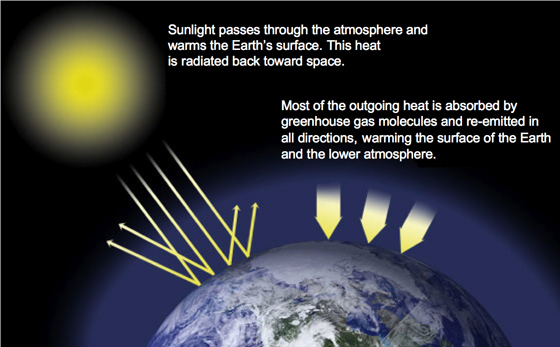
A layer of greenhouse gases (GHGs) – primarily water vapor, and including much smaller amounts of carbon dioxide, methane and nitrous oxide – acts as a thermal blanket for the Earth, absorbing heat and warming the surface to a life-supporting average of 59 degrees Fahrenheit (15 degrees Celsius). Since the Industrial Revolution, GHGs have been accumulating in the atmosphere, increasing the Earth’s temperature. Nine of the ten hottest years ever recorded have occurred since 2000. 2014 was the hottest year on record. (Graphic from NASA.gov)
From Farm to Table: Four steps bring food to the table. Food is produced, then transported, then packaged and stored, and then prepared for eating, usually involving cooking.
Production–>Transportation–>Storage–>Preparation
And significant amounts of it at each step along the way is wasted. All of this contributes to greenhouse gas (GHG) emissions.
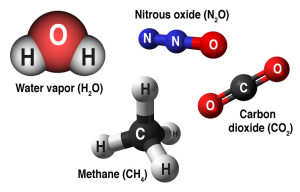
Gases that contribute to the greenhouse effect include: (Graphic from NASA.gov)
Carbon dioxide comes from burning fossil fuels (coal, oil and natural gas) used to create electricity, heat and transportation. In producing food, fossil fuels power farm machinery and transport, store and cook foods.
Methane is produced by the intestinal fermentation in ruminant (cud-chewing) livestock like cows.
Nitrous oxide is released from tilled and fertilized soils.
Both methane and nitrous oxide are many times more potent GHGs than carbon dioxide, and all are more potent than water vapor in creating the greenhouse effect.
Food production is responsible for about one-fifth of all GHG emissions. GHG emissions are much greater with animal-based products, as measured in numerous studies. One contributing factor is that land is required both to grow grains and to raise animals, instead of using it just to grow local crops for human nourishment. Moreover, clearing additional land for these purposes leads to deforestation which contributes to 12-17 percent of annual global greenhouse gas emissions. (World Resources Institute)
 One United States school that teaches about sustainable, delicious and healthful eating is The MUSE School in Los Angeles, founded by Suzy Amis Cameron and film director James Cameron. The 2015-2016 school year is the first year MUSE is entirely a plant-based school.
One United States school that teaches about sustainable, delicious and healthful eating is The MUSE School in Los Angeles, founded by Suzy Amis Cameron and film director James Cameron. The 2015-2016 school year is the first year MUSE is entirely a plant-based school.
“Our commitment to plant-based food is called ‘One Meal a Day for the Planet.’ Each day, our MUSE Kitchen staff prepare 100% plant-based lunches and snacks for the MUSE community.
“Our transition to a plant-based meal program is based upon MUSE’s commitment to sustainability. Food choice is the most efficient way to reduce our impact on the environment. The typical American diet uses up to ten times more land than a plant-based diet.”
Animal Welfare
Some people who choose not to eat animals or animal products do so because of a belief in the right of animals to exist freely without human interference.
Children are particularly aligned with animals. They love stuffed animal toys, pets and cartoon characters. They easily understand that one way to care for animals is to eat a whole food, plant-based diet. One organization, the United States-based Animal Hero Kids, teaches children to be compassionate toward all living things, encouraging children to follow a plant-based lifestyle. Hip hop mogul Russell Simmons, at one of this organization´s events, told the audience:
“I think it’s important that kids learn compassion and that they be connected to their true spirits. Their true spirits are compassionate. The unconscious behavior of most humankind is not inspiring or uplifting when it comes to the treatment of animals, whether it’s the eating of them or the abuse of the planet. When kids learn [this lesson] early, they take it with them throughout life.”
In many cultures, it is challenging to bring consciousness about the welfare of animals into adulthood. Neal Barnard, M.D., in his article entitled “The Psychology of Abuse”, explains that:
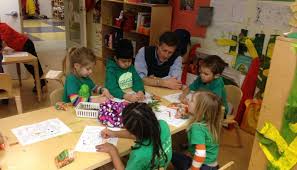 “As children, we naturally recognize our commonality with other creatures. We feel a bond with them, and incorporate them into our stories and playthings. As we attempt to leave the relics of childhood behind, however, associations with animals make us—especially the males among us—uncomfortable. To care about the suffering of animals calls up the childhood one is trying to leave behind.”
“As children, we naturally recognize our commonality with other creatures. We feel a bond with them, and incorporate them into our stories and playthings. As we attempt to leave the relics of childhood behind, however, associations with animals make us—especially the males among us—uncomfortable. To care about the suffering of animals calls up the childhood one is trying to leave behind.”
We can help children understand that the transition into adulthood does not necessitate a change in the way that animal welfare is viewed.
World Hunger
Hunger and poor nutrition exist throughout the world, not limited to war-torn and poor countries. Consider the following, from the Save the Children Foundation, about nutrition in the United States:
By The Numbers: Hunger in America
23 MILLION
More than 23 million people in America live in food deserts. They don’t have grocery stores, so their only choices for food are convenience stores and fast food restaurants. (USDA)
12.5 MILLION
Approximately 17% (or 12.5 million) of U.S. children and adolescents aged 2 to 19 years are obese. (CDC)
13%
While a large majority (75%) of U.S. women start out breastfeeding their babies, only 13% breastfeed exclusively until their baby is 6 months old. (CDC)
80%
On a typical school day, 80% of U.S. kids drink sugary drinks, the largest source of added sugar and a major source of calories in children’s diets. (CDC)
Children deserve to eat the kinds of foods that make them stronger, not foods that make them sick. We can do this if people have access to healthy food, can afford to buy it, know how to cook it, learn to enjoy it and choose to eat it.
The 4COS4S Medical Project
A couple of days ago, we were having a 4 COS4S meeting in a restaurant when a mother with an 8-month old son overheard our conversation. She said, “I am vegan and I want to raise my son vegan. I recently weaned him from breast milk. Yesterday I saw his pediatrician who told me that I am harming him by not feeding him animal products. He specifically told me not to feed him lentils or other legumes, and to avoid most vegetables.”
 Caty heard this and got fired up, “We have to educate educators, parents AND doctors!” She immediately arranged meetings with key people at local hospitals. So an arm of the 4 COS4S project will be moving in that direction as well.
Caty heard this and got fired up, “We have to educate educators, parents AND doctors!” She immediately arranged meetings with key people at local hospitals. So an arm of the 4 COS4S project will be moving in that direction as well.
During my 20 years as a doctor at Boston’s Massachusetts General Hospital, I can’t count the number of times I rounded on patients at meal time and looked at their hospital trays in dismay. The BBC published an article on the “grim food” in British hospitals that included photos like this one of mashed potato and “fried, breaded something”.
Maybe, one day, HappyCow.net will have reason to add a new category to its listings: hospitals that follow 4 COS4S guidelines.
We will keep you posted.
About the author: Kathryn Hayward, M.D. was a primary care internal medicine specialist at the Massachusetts General Hospital and Harvard Medical School for 20 years. She now lives in Mallorca, Spain, where she practices Integrative Health in the United States and elsewhere through Odyssey Journey: A Collaborative Approach to Wellness, and is co-founder of International Integrators, a community devoted to the global promotion of Integrative Health. Join Kathryn, Caty, David and the International Integrators Team during our immersion retreat Living Whole Ávila, Spain from June 12-17, 2016.




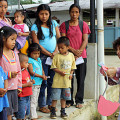

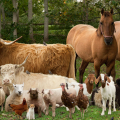
No Comments